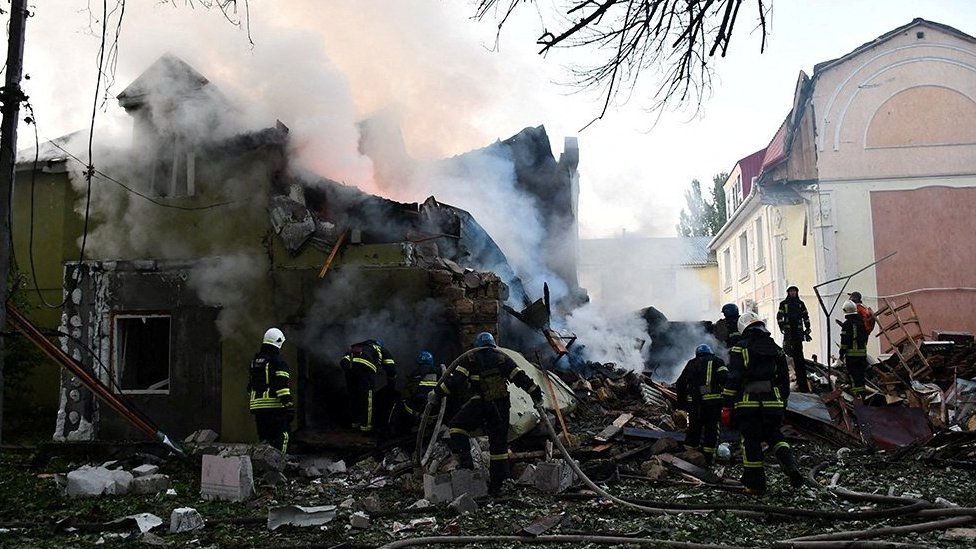Russia: As Duplicitous As Its Word
"In the seaport of Odesa sea-based high precision long-range missiles destroyed a docked Ukrainian warship and a warehouse of Harpoon anti-ship missiles supplied by the United States to the Kyiv regime."Russian Foreign Ministry"Russia doesn't break its patterns of breaking agreements. Yes, I was hopeful, along with all those countries waiting for the grain [as per agreement signed by Moscow and Kyiv].""But no surprises from Moscow, just their usual terrorist aggressive behaviour."Lesia Vasylenko, Ukrainian MP
 |
| Daily News Egypt |
The very day following the Turkey-U.S.-brokered deal signed by both Kyiv and Moscow, to re-open Ukraine's Black Sea ports to the export of grain to alleviate an acute food shortage, saw Russian forces despite the pledge taken by the Kremlin via the signed agreement, bomb the Odesa port, the largest in Ukraine. On Friday, at the signing of the deal, there was euphoria; the world's largest exporters of food would resume shipments averting the threat of famine that millions could face, consequential to Russia's invasion of Ukraine.
As a result of the five-month conflict following Russia's invasion of Ukraine, food prices globally have dramatically risen, as has energy. Russia had been left free to export its oils and grains, yet its complaint that its shipments abroad were under Western sanctions eschews responsibility. Moscow saw nothing amiss however, in blocking Ukraine from shipping its export-destination oils and grains, leaving parts of the Middle East and Africa on tenterhooks of food insecurity.
 |
Turkey had intervened, as the country whose control of straits leading into the Black Sea made it a logical player in Russia's game of food and energy blackmail. The Russian port strike came close to negating the practicality and release of the agreed-upon shipments of Ukrainian food to a waiting world following missiles fired at Ukraine's main Black Sea port. Russia's retort was that the missiles destroyed a warship and anti-ship missiles at Odesa, despite vows to lift the grain blockade.
The 'diplomatic breakthrough' the agreement portended, casually shifted aside by the Kremlin. Punishment for Ukraine's successes on the battlefield, for its surprise strengths in effecting a counter-offensive, in forcing Moscow to pay dearly for its wanton destruction of Ukrainian infrastructure, its direct bombing of hospitals, schools, its levelling of towns and villages, its violent disregard of people's lives, its responsibility in driving millions of civilians from their homes.
The Ukrainian military unsurprisingly had a different story than Moscow's, that missiles aside, preparations were to resume the shipping of grains globally. "We continue technical preparations for the launch of exports of agricultural products from our ports", stated Oleksandr Kubrakov, Ukrainian infrastructure minister, even as the Kremlin initially denied firing at Odesa. Around 15 percent of global grain supplies emanate from Ukraine.
Back in control of Snake Island following Russian troop withdrawal from the critically positioned control post guarding shipping lanes in the Black Sea along with the arrival of long-range artillery from the U.S. , Russia was placed in the uncomfortable position of having to negotiate to lift its blockade; a situation helped along by vigorous lobbying from African and Middle Eastern Kremlin allies influencing Moscow further.
Egypt, set to be hugely impacted by the stoppage of grain shipments so hugely depended upon, hosted Russia's foreign minister Sergei Lavrov last week before he went on to tour Ethiopia, Uganda and the Congo Republic. The Russian state nuclear agency Rosatom is under contract to begin work on Egypt's first nuclear power station. To Egypt's government, Mr. Lavrov made it clear that the global shortage of grain was a result of sanctions imposed by the West.
"On the topic of food, the West must eliminate the problems it has created itself", he stated, stretching even the credulity of Russia's forgiving allies. Lifting Ukraine's ports blockade will benefit Russia as well as Ukraine, enabling the Kremlin to take in more proceeds from grain and fertilizer sales, all welcome to continue funding Russia's war on Ukraine. The gratitude Russia will receive from its allies in North Africa and the Middle East, more pluses for the Kremlin.
Russia hungers for good news to boost Moscow's morale. According to a Ukrainian official, by September Russian-occupied southern Kherson region will be back in Ukrainian control. Backed by sophisticated Western weapons newly received, including long-range HIMARs, Ukrainian forces are steadily defeating the Russian army in the region.
"Kherson region will definitely be liberated by September. We can say that a turning point has occurred on the battlefield.""We see that our armed forces are advancing openly.""We can say that we are switching from defensive to counter-offensive actions."Sergey Khlan, aide, Ukrainian head, Kherson region
The war's momentum has seen a turnaround with the arrival a month ago of HIMARs, allowing Ukraine now to hit Russian supply lines, command centres and allied infrastructure, resulting in widespread damage to Russian equipment and personnel. Before the advent of the longer-range missiles, Russian targets had been located too far behind the front lines to be susceptible to strikes. That has changed.
 |
| Residential buildings in Mykolaiv were damaged and officials said 12 people were wounded STATE EMERGENCY SERVICE OF UKRAINE |
Labels: Black Sea Port Blockades, Counter-Offensive, Russian Invasion of Ukraine, Russian Military, Ukrainian Military
0 Comments:
Post a Comment
<< Home